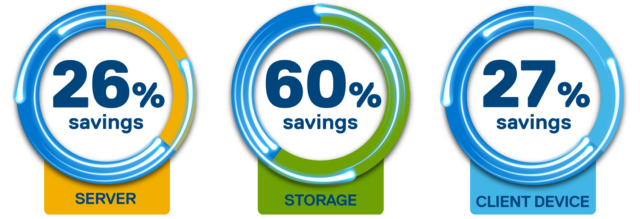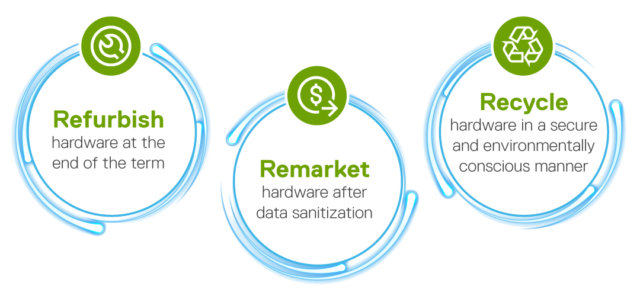Businesses are constantly seeking ways to push IT performance boundaries and improve operations. The more efficient the business can operate, the more productivity the organization can achieve. To accelerate growth, organizations look to information technology to improve performance.
According to IDC research, 59% of organizations are focused on reducing the time and effort to manage technology investments.¹ Prioritization is placed on digital transformation to deliver the most business value and growth.
Technology challenges
Operating older infrastructure can be very challenging. IT administrators spend most of their time managing day-to-day operational patches and fixes, and mitigating security concerns. Not all equipment is going to function optimally. Symptoms can include crashes, slower-than-normal performance or random shut down of applications. The problem increases exponentially as hardware ages further into the lifecycle. System issues also lead to financial challenges. Downtime and productivity loss cuts into revenue.
IDC research has found that the average life span of technology is between 3.4 to 4 years for servers, storage and client devices.¹ Organizations must continually inject cash to procure new hardware every few years to achieve efficiencies and agility. The high cost of the outright purchase of new hardware can prohibit scalability and limit the ability to proactively keep pace with business demands.
Cost savings and efficiencies
Technology Rotation* is a business strategy enabling organizations to simplify the procurement process, maintain liquidity, take advantage of current-state technology and contribute to the circular economy.** This eases cash flow, streamlines hardware acquisition and improves operational efficiency. Equipment can be rotated out before it becomes obsolete and replaced with the latest technology delivering high performance capability that is scalable. Companies can accelerate and enhance digital transformation with a planned refresh of assets, thus optimizing productivity and overcoming challenges throughout the technology lifecycle. Technology acquisition is no longer a massive capital outlay.
The financial benefit is the savings on total cost of usage (TCU) of IT assets, providing operations the ability to better meet future infrastructure goals. According to an IDC interview, Dell customers have found they are achieving 26% server savings, 60% storage savings and 27% client device savings over a six year period, compared to ownership, by utilizing Technology Rotation.¹ This allows for ease of adoption of new technologies and platforms. Modern equipment enables organizations to operate with agility and efficiency. Security risks associated with IT assets are reduced. IT management can therefore focus on strategic initiatives.
 Revenue growth
Revenue growth
40% of companies reported that revenue acceleration is attributed directly to Technology Rotation’s IT asset refresh.¹ Customers can run multiple projects simultaneously with better performing equipment that costs less. Savings from lower operating and asset acquisition costs allows for reinvestment in strategic business projects that delivers ROI growth.
Increase reliability and employee satisfaction
Operating with new equipment ensures that everything is reliable and compatible with the latest standards. This helps reduce the number of issues organizations have to face while saving on maintenance and upgrade cost.
Customers have found employee productivity loss dropped by 97%. There was a reduction of 36% staff time required to patch and update, 40% to decommission, 29% to support and 37% to deploy IT assets.¹ Employees with access to better equipment and the latest tools have lower downtime and improved employee satisfaction.
Contributes to the circular economy
As part of sustainability initiatives, IT leadership will need to implement circular economy programs into their IT planning. A circular economy gives IT managers the tools to tackle resource use, climate change and biodiversity loss while addressing important social needs. Technology Rotation supports organizations in meeting sustainability goals by replacing outdated equipment that is no longer operating at peak performance and replacing it with new technology that creates a positive impact on the environment. Old hardware is refurbished, remarketed or recycled in a secure and transparent manner.
Dell is a single source provider for payment solutions for hardware, software, peripherals and support. There is no need for multiple payment providers. At the end of the equipment lifecycle, there is peace of mind, knowing that assets are properly disposed of through sustainable means. Partner with Dell to accelerate the circular economy.
We invite you to read IDC Business Value Study and learn more about Technology Rotation.
¹ Source: IDC Infobrief, sponsored by Dell Technologies, “The Business Value of Dell’s Technology Rotation Program,” October 2021.
*All websites referenced in this article are intended for readers located in the United States only. Readers outside of the United States may access their county’s website by selecting their location from the location menu. Products and offers may not be available or may vary by country.
**Payment solutions provided and serviced by Dell Financial Services L.L.C. or its affiliate or designee (“DFS”) for qualified customers. Offers may not be available or may vary in certain countries. Where available offers may be changed without notice and are subject to product availability, applicable law, credit approval, documentation provided by and acceptable to DFS and may be subject to minimum transaction size. Offers not available for personal, family or household use. Dell Technologies and the Dell Technologies logo are trademarks of Dell Inc. Restrictions and additional requirements may apply to transactions with governmental or public entities. FAIR MARKET VALUE (“FMV”) LEASE: At the end of the initial FMV Lease term, lessee may 1) purchase the equipment for the then FMV, 2) renew the lease or 3) return the equipment to DFS.



